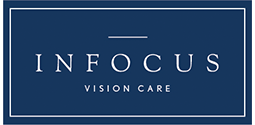An eye examination is important to determine your refraction correction and overall eye health. The most frequently asked question by patients is how often they should have an eye exam. The answer to this question is not so simple since eye health can vary from person to person.
What Does an Eye Exam Entail?
Optometrists perform various exams to evaluate vision and eye health. A full comprehensive eye exam evaluates how well the eyes are functioning. There will be several tests conducted by the eye care professional, including visual acuity, refraction, intraocular pressure, and retinal examination. These tests examine your vision to determine whether correction is required in the form of glasses or contact lenses, along with a thorough assessment of your eye health to determine the condition of your eyes.
A full comprehensive eye exam appointment is available at inFocus Vision Care. Book now!
A Quick Guide to Determining the Frequency of Your Eye Exam.
There are a variety of factors that contribute to the need for an eye examination. Some factors include: age, medical conditions, lifestyle, and family history.
Age
- Annual eye examinations for school-aged children (0 to 19 years old) are recommended to ensure precise vision development as it plays an important role in their learning. An eye exam will determine whether additional assistance is needed to improve their learning skills.
- In adults from 20 to 64 years old, a full comprehensive eye exam should be completed at least every two years. This will ensure an update of your vision and eye health.
- Due to a higher risk of eye disease in those over 65 years of age, eye exams are recommended every 18 months.
Medical Conditions
Eye doctors may recommend more frequent appointments if you have a pre-existing medical condition, such as glaucoma or diabetes. In patients with medical conditions, the risk factors of eye diseases are higher, which is why your eye doctor might want to follow up more regularly.
If you notice any of the following symptoms listed below, schedule yourself an eye appointment:
- blurry vision
- double vision
- eye pain
- headaches
- dry eye
- difficulties in seeing after sunset
Additionally, if you experience any injury to your eye or head, please seek urgent care to prevent vision and eye damage.
Lifestyle
Our daily routine and lifestyle play a major role in our eye health. Long hours at the computer can be a contributing factor in the development of dry eye disease or eye strain. Accordingly, an eye examination can be valuable to prevent undetected eye problems.
Family History
You might be wondering, how does family history affect eye health? We just discussed how everyone’s eyes and eye health differ. Despite that, genetics can play a crucial role in our eye health, and a thorough knowledge of your family history can assist your optometrist in watching for those particular signs. Maintaining good eye health and catching eye disease early can be achieved by scheduling annual eye exams.
These are general guidelines; the frequency of your eye examination will be determined by your local optometrist. Interested in scheduling an appointment? Visit our booking portal.
What Tests Are Performed in an Eye Exam?
Visual Acuity: The testing of visual acuity is one of the many aspects of a comprehensive eye examination; it determines how well you are able to see with and without correction. Various letters or symbols are used at a standard distance to determine how easily you are able to distinguish them. This test gives your optometrist an indication of whether you require correction for nearsightedness, farsightedness, or astigmatism.
Refraction Test: The optometrist will perform a refraction test after performing the visual acuity test. The refraction test consists of a series of lenses of different power that are placed in front of the eyes to determine whether glasses or contact lenses are needed. This test will provide you with your final eyeglass prescription.
Intraocular Pressures Test: The intraocular pressure (IOP) is the fluid pressure within our eyes and is measured with a tonometer. The fluid within our eyes is drained regularly to maintain a safe IOP. Elevated IOPs can commonly be present in individuals and can lead to damage of the optic nerve, ultimately leading to glaucoma.
Retinal Exam: Eye drops are used to dilate the pupils to examine your retina under a bright light with a special microscope to examine the retina. A retinal examination will allow your eye doctor to assess the retina, the optic nerve, and the blood vessels.
Keep Your Eyes Healthy by Having Regular Eye Exams!
A comprehensive eye exam provides a thorough evaluation of your vision and eye health. Moreover, an eye exam can discover underlying and life-threatening health issues such as an undetected stroke, disease, diabetes, high blood pressure or cancer. Make your eye health a priority and visit your optometrist on a regular basis!
Need an appointment? Book your eye exam!



